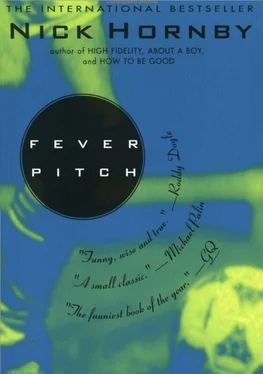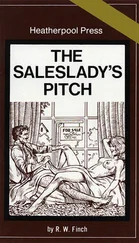I have listened to and read the arguments of hundreds of fans who disagree with the Taylor Report, and who see the future of football as a modified version of the past, with safer terraces and better facilities, rather than as anything radically different. And what has struck me most is the conservative and almost neurotic sentimental attachments these arguments evince—in a sense, the same kind of neurotic sentimental attachment that informs this book. Every time a club mentions a new stadium, there is an outcry; when Arsenal and Tottenham mooted ground-sharing a few years back, at a projected site near, I think, Alexandra Palace, the protests were loud and long (“Tradition!”), and as a consequence we now find ourselves with an assortment of the tiniest stadia in the world. The Stadium of Light in Lisbon holds 120,000, the Bernabeu in Madrid 95,000, Bayern Munich’s ground 75,000; but Arsenal, the biggest team in the biggest city in Europe, will be able to squeeze in less than forty thousand when their development is completed.
We didn’t want new grounds, and now we don’t want the old ones, not if they have to be modified to ensure our safety and the clubs have to charge more as a consequence. “What if I want to take my kids to a game? I won’t be able to afford it.” But neither can we afford to take our kids to Barbados, or to Le Manoir aux Quat’ Saisons, or to the opera. Come the Revolution, of course, we will be able to do all those things as often as we like, but until then this seems a particularly poor argument, a whinge rather than a cogent objection.
“What about the little clubs who might go to the wall?” It will be very sad for Chester’s couple of thousand fans if their team goes under—I would be devastated if I were one of them—but that in itself is absolutely no reason why clubs should be allowed to endanger the lives of their fans. If clubs have to close down because they do not have the money for the changes deemed necessary to avoid another Hillsborough, then so be it. Tough. If, like Chester and Wimbledon and scores of other teams, they are poor, it is in part because not enough people care whether they survive or go under (Wimbledon, a First Division team in a densely populated area, attracted tiny crowds even before they were forced to move to the other side of London), and that tells a story of its own. However, the converse of this is that there is absolutely no chance of being crushed on a terrace at these grounds; forcing clubs to install seating for fans who have their own back-garden-sized patch of concrete to stand on is ludicrous.
“What about the supporters who have followed the club through thick and thin, paid the players’ wages? How can clubs really contemplate selling them up the river?” This is an argument that goes right to the heart of football consumption. I have explained elsewhere that if clubs erode their traditional fan base, they could find themselves in serious difficulties, and in my opinion they would be misguided to do so. Obviously the ground improvements have to be paid for somehow, and increased admission prices are inevitable; most of us accept that we will have to pay another couple of quid to watch our team. The bond schemes at Arsenal and West Ham go way beyond that, however: using these price increases to swap one crowd for another, to get rid of the old set of fans and to bring in a new, more affluent group, is a mistake.
Even so, it is a mistake that clubs are perfectly at liberty to make. Football clubs are not hospitals or schools, with a duty to admit us regardless of our financial wherewithal. It is interesting and revealing that opposition to these bond schemes has taken on the tone of a crusade, as if the clubs had a moral obligation to their supporters. What do the clubs owe us, any of us, really? I have stumped up thousands of pounds to watch Arsenal over the last twenty years; but each time money has changed hands, I have received something in return: admission to a game, a train ticket, a programme. Why is football any different from the cinema, say, or a record shop? The difference is that all of us feel these astonishingly deep allegiances, and that until recently we had all anticipated being able to go to watch every game that our team plays for the rest of our lives; now it is beginning to appear as though that will not be possible for some of us. But that won’t be the end of the world. It could even be that increased admission prices will improve the quality of the football we watch; perhaps clubs will be able to play fewer games, the players will become injured less frequently, and there will be no need to play in rubbishy tournaments like the ZDS Cup in order simply to earn a few quid. Again, one must look to Europe: the Italians, the Portuguese and the Spanish have high ticket prices, but they can afford to pay for the best players in Europe and South America. (They are also less obsessed with lower league football than we are. There are third and fourth division clubs, but they are semi-professional, and do not influence the way the game is structured. The First Division takes precedence and the football climate is all the healthier for it.)
Over the years we have come to confuse football with something else, something more necessary , which is why these cries of outrage are so heartfelt and so indignant. We view everything from the top of this mountain of partisan passion; it is no wonder that all our perspectives are wrong. Perhaps it was time to climb down, and see what everyone else in the outside world sees.
For the most part, what the outside world saw made a lot of cold, harsh, practical sense. The cover of The Economist that week carried a picture of the extraordinary shrine of flowers, flags and banners that Liverpool and Everton fans and hundreds of others had created in the goalmouth beneath the Kop at Anfield; the headline, neatly placed just above the crossbar, was “The game that died”. I bought the magazine, for the first and only time, and was shocked to realise how much I found myself agreeing with it. Perhaps it was predictable that a magazine entitled The Economist should be best equipped to penetrate the muddle that football had got itself into; here, after all, is a multi-million-pound industry which doesn’t have two pennies to rub together.
The Economist on the inevitability of the disaster: “Hillsborough was not just a calamitous accident. It was a brutal demonstration of systematic failure.” On the state of the grounds: “Britain’s football grounds now resemble maximum-security prisons, but only the feebleness of the regulations has allowed the clubs to go on pretending that crowd safety is compatible with prison architecture.” On the football authorities: “For complacency and incompetence, there’s nothing like a cartel; and of Britain’s surviving cartels, the Football League is one of the smuggest and slackest.” On the people who own football clubs: “Like old-fashioned newspaper magnates,(they are willing to pay for prestige—which they see in terms of owning star players, rather than comfortable modern stadiums.” And on what needs to be done: “Having fewer clubs, operating out of smarter stadiums, ought to revive the interest of those who have been driven away from football during the past ten years.”
These views and others in the same issue—well-informed, well-argued, devoid of the football authorities’ dilatory self-interest, the Government’s loathing for the game (if Hillsborough did nothing else, it wrecked Thatcher’s ludicrously misbegotten ID-card scheme) and the distorting obsession of the fans—helped one to begin looking at the whole football débâcle with something approaching clarity. It was only after Hillsborough, when outsiders began to take an interest in the way football conducts itself, that it became clear just how deeply entrenched in the football way of looking at things we had all become. And that way, as parts of this book demonstrate, is not always the wisest.
Читать дальше











